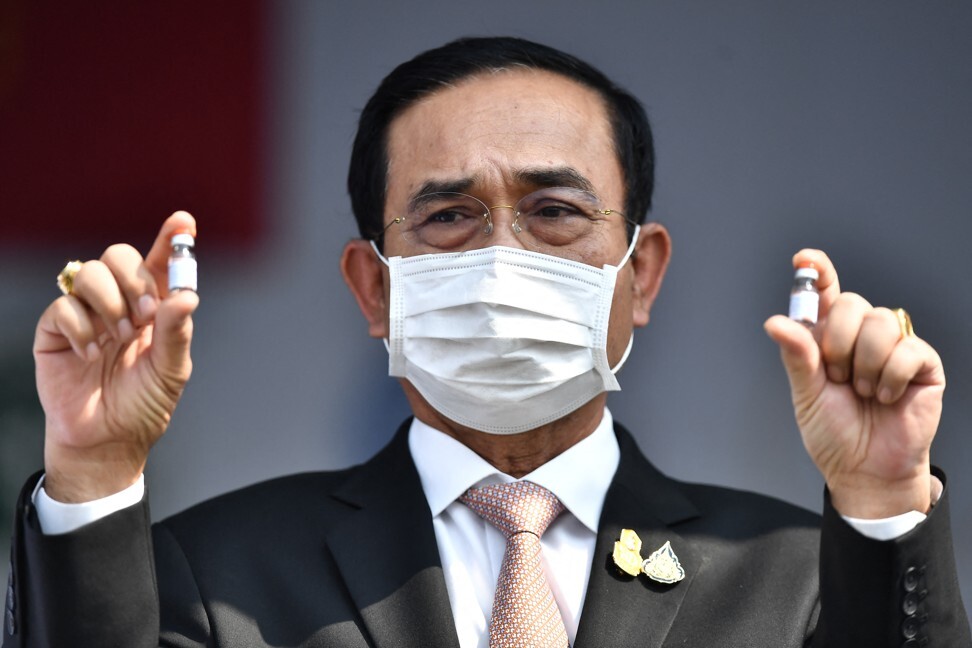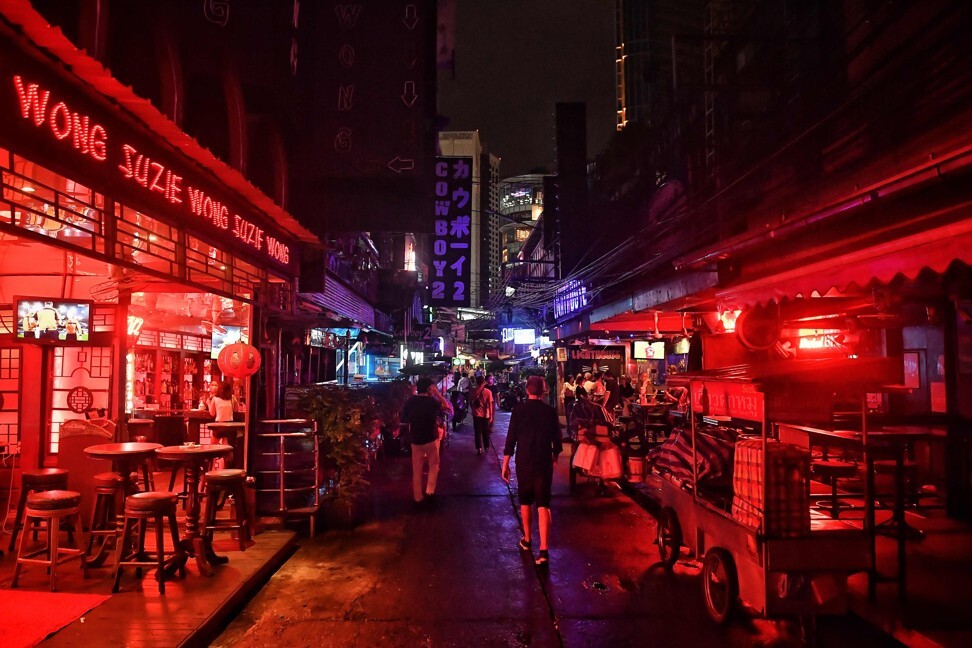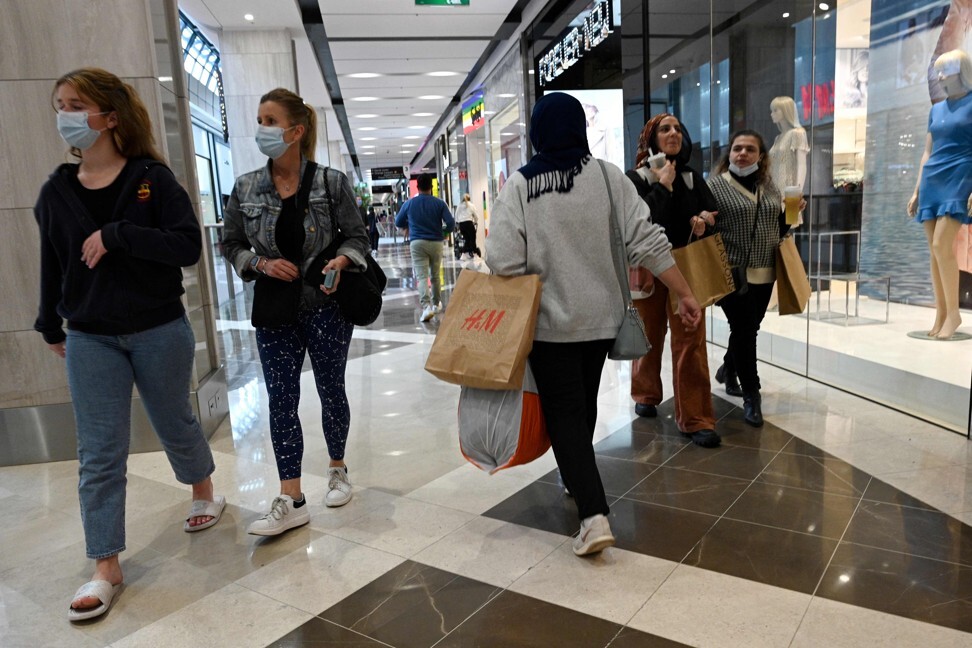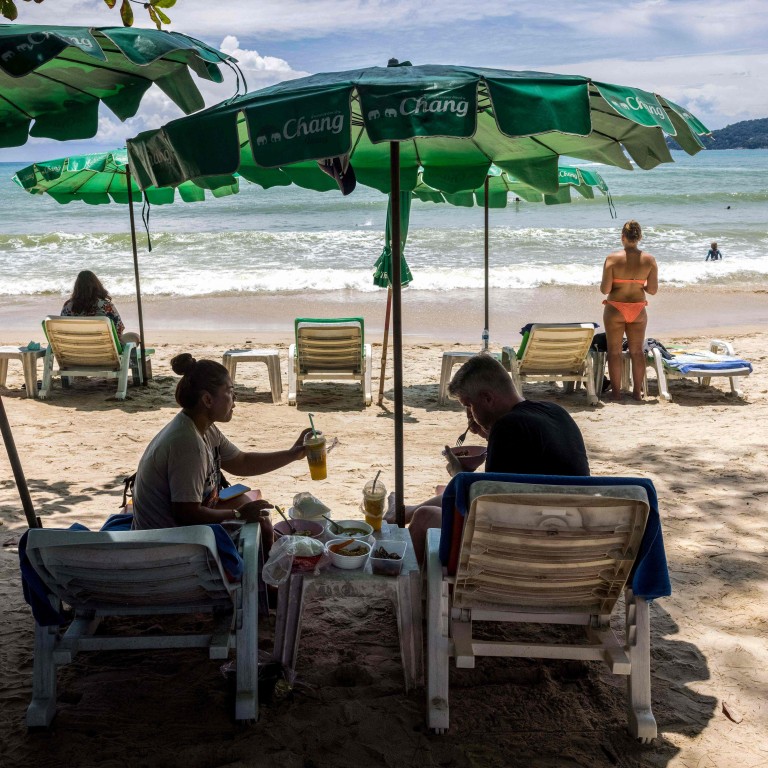
Coronavirus: Thailand to reopen to vaccinated tourists from ‘low-risk’ countries from November
- Premier Prayuth Chan-ocha announced the country will be reopening its borders to vaccinated tourists travelling by air from ‘low risk countries’
- The 10 nations considered low risk include China, Britain, the United States, Germany and Singapore
But Covid-related travel restrictions have left the economy battered, contributing to its worst performance in more than 20 years.
Premier Prayuth Chan-ocha announced on Monday the country will be reopening its borders to vaccinated tourists travelling by air from “low-risk countries”.
The 10 nations considered low risk include Britain, the United States, China, Germany and Singapore.
“When they arrive, they should present a (negative) Covid test … and test once again upon arrival,” the prime minister said in a televised address.
After getting a negative test, “they can travel freely like Thais”, he said.
His announcement significantly loosens up current restrictions in place for vaccinated tourists, who must undergo at least seven days hotel quarantine.
Coronavirus: Sydney set for reopening; anger in Vietnam over killing of 13 dogs as owners get Covid-19
Thailand’s so-called “sandbox” scheme in Phuket – which allows vaccinated tourists to move freely around the popular beach island – currently requires them to remain there for a week.
Visitors outside Thailand’s designated 10 low-risk countries are welcome, “but they have to be in quarantine,” said Prayut, adding that more nations would be added to the greenlit list in December.
Earlier this year Prayut had vowed the country would reopen in October, stating its vaccination campaign would be sped up to reach 70 per cent of the population.
To date, 48 per cent of Thais nationwide have received at least a single vaccine dose, while more than 30 per cent have been double-jabbed, health officials said on Monday.
The capital Bangkok – once famed for its nightlife – is still currently under a nighttime curfew, as well as an alcohol ban in bars and restaurants.
Prayut said on Monday authorities will “consider allowing alcoholic drinks in restaurants and reopening entertainment venues under strict health measures” during the New Year’s Eve period – previously a moneymaker for the kingdom’s tourism sector.
He acknowledged his decision to reopen in less than a month came with the risk of more coronavirus cases.
How Asia’s factory disruptions are hurting brands from Apple to Toyota
“But I think the people will not be able to stand it if they have to lose a second chance at this business opportunity,” the premier said, pointing to countries like Britain and Australia loosening their travel restrictions.
“The time has come for us to ready ourselves to face the coronavirus and live with it … much as we have learnt to live with other diseases with treatments and vaccinations,” he said.
Last year, Thailand lost about US$50 billion in tourism revenue as foreign arrivals plunged 83 per cent to 6.7 million, from a record 39.9 million two years ago.
The kingdom is still registering about 10,000 new cases a day – largely fuelled by the highly contagious Delta variant. It has more than 1.7 million cases to date and has recorded 17,751 dead.
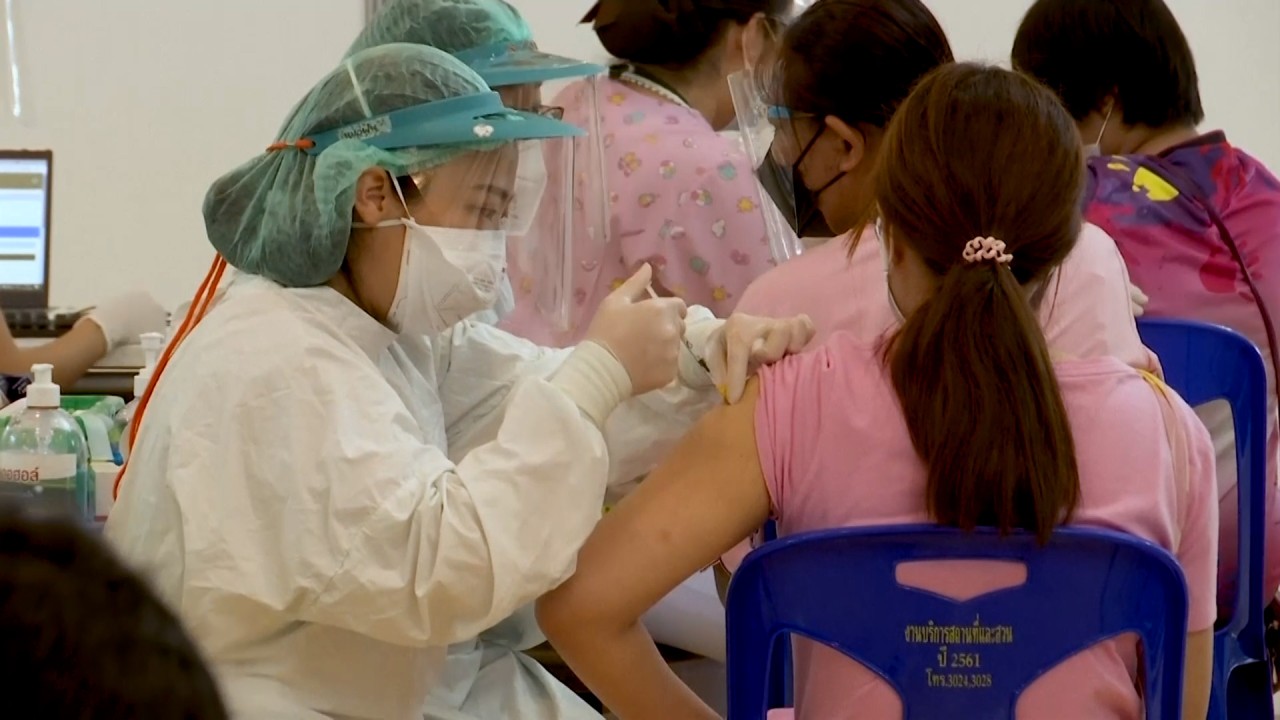
01:47
About 1,500 teenagers in Bangkok receive Pfizer-BioNTech vaccinations
Singaporeans increasingly back living with Covid-19: poll
Nearly one-third of Singapore’s residents now support living with Covid-19, a poll showed, after a push by its leader to treat the pathogen as endemic.
Some 29 per cent of respondents support such a strategy, according to an online poll conducted by Milieu Insight, a Singapore-based consumer insight and analytics firm, compared to 23 per cent in a prior survey conducted earlier this month after the government tightened some antivirus measures.
About 15 per cent of the 1,201 people queried prefer a strict Covid-Zero policy, down from 22 per cent, while 43 per cent prefer a mix of the two approaches, it found.
In a speech on Saturday, Prime Minister Lee Hsien Loong pushed for a strategy of living with the virus, as the Southeast Asian nation doubles down on its commitment to shift away from a Covid-Zero strategy, a change being followed by stalwarts Australia and New Zealand.
Singapore cannot stay closed off indefinitely, though there will continue to be Covid-19 cases, he said.
The government unveiled a host of new measures over the weekend, including simplified testing protocols, home-recovery programmes and banning unvaccinated people from malls. It also expanded eligibility for booster shots to those aged 30 and above who were fully vaccinated.
Singapore on Tuesday recorded 2,976 new Covid-19 cases and 11 deaths.
Sydney cases ease as focus shifts to reviving economy
Pubs, cafes and retail stores reopened in New South Wales (NSW), home to Sydney, on Monday after vaccination levels in the state’s adult population crossed 70 per cent.
New daily infections in the state fell to 360 on Tuesday, the majority in Sydney, marking a steady downward trend.
“It is going to be boom time in New South Wales for every single business and worker across our state,” Premier Dominic Perrottet said during a media briefing on Tuesday as he unveiled a support package for firms to help them prepare for a “bright summer”.
Perrottet said businesses will be compensated for any Covid-19 lockdowns in December and January, encouraging them to stock up ahead of the busy summer holiday period. Under the plan, small firms can access grants of up to A$20,000 (US$14,690) if they are forced to close then.
‘Freedom day’ as Sydney ends nearly four-month Covid-19 lockdown
Sydney, along with Melbourne and Australia’s capital Canberra, are in the grip of a third wave of infections fuelled by the highly infectious Delta variant, with all cities looking to begin easing curbs in stages when full vaccination rates reach 70, 80 and 90 per cent.
Canberra is on track to exit its lockdown on Friday, joining Sydney, as inoculations neared 75 per cent there. The vaccination rate in Victoria, which includes Melbourne, is expected to top 70 per cent in people above 16 around late October, when some curbs will ease. It reported 1,466 cases on Tuesday, the lowest in six days.
The federal government has been pressing states to begin living with the virus when vaccination rates reach 70-80 per cent but some virus-free states said they may delay their reopening amid concerns that a surge in cases will overwhelm their health systems.
Higher vaccination levels among the most vulnerable population has helped Australia to keep the death rate from the Delta strain lower than last year’s outbreaks. It has recorded some 131,400 cases and 1,461 deaths since the pandemic began.
Tokyo court disrupted by hundreds of anti-vaxxers
Several hundred people without face masks caused a disruption at the Tokyo District Court on Tuesday, ahead of a hearing of a case brought by plaintiffs opposed to Covid-19 vaccinations.
Court officials scrambled to implement anti-coronavirus measures after a long line of unmasked people formed at the security checkpoint of the building’s entrance ahead of the hearing, which was due to begin at 1.30pm, with some other visitors seen complaining they would be late for their sessions.
The plaintiffs have claimed in the lawsuit that “there is no scientific evidence of vaccine safety. The effectiveness of masks is also questionable”.
Using their website, the plaintiffs called on people to come to the court and hear the first oral arguments of the suit. The Tokyo High Court, which manages the building, advises visitors to wear masks but cannot compel them.
Japan’s new PM vows to end pandemic crisis, boost defences
The lobby of the building on the first floor and the outside the courtroom for the hearing on the seventh floor were overcrowded with unmasked people.
According to a nearby police station, the group was believed to number more than 300, and some police officers were sent outside the building.
Japan plans to widely use vaccine passports for commercial purposes as part of efforts to normalise social and economic activities that have long been stagnant due to the coronavirus pandemic.
In recent weeks, Tokyo has seen a sharp fall in Covid-19 cases in tandem with stepped-up vaccinations. But people are still urged by the government to wear face masks to prevent the spread of the virus.
The capital hit a record 5,773 cases on August 13, days after the closing of the Olympics.
Reporting by AFP, Bloomberg, Reuters, Kyodo

